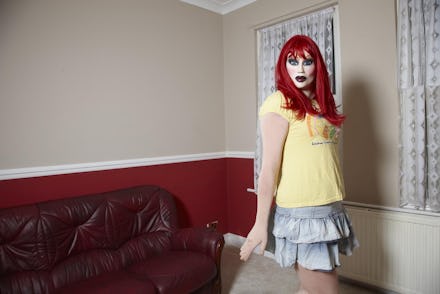'Secrets of the Living Dolls' — Q&A With the Filmmakers Behind the Mesmerizing Documentary

'This eye-opening documentary, which had nearly 3.7 million views in its first week in the UK, takes its viewers into the bizarre and captivating world of "living dolls." As Channel 4 explains, "Female maskers, also known as 'dolls', are a hidden community of ordinary family men who lead extraordinary double lives, dressing up in elaborate rubber suits as they strive to become their own ideal fantasy woman."
According to Channel 4, there are thousands of "living dolls" all over the world, but most keep their double life a secret.
PolicyMic interviewed producer Luke Malone and director Nick Sweeney via e-mail about the process of making the film, and the unexpected flood of attention that has followed.
Laura Dimon [LD]: Tell us a little bit about this project. What is involved in their dressing process, how often do they do it, why, and how did they find each other?
Luke Malone [LM]: In some ways, this is a difficult question to answer. We set out to capture an honest representation of masking, and I think we achieved that because the documentary highlights how it means different things to different people. For some it’s a passionate hobby whereas for others it’s a lifestyle bordering on obsession. To this end, some maskers go all out and spend thousands on custom-made masks and Femskins while others prefer cheaper masks that they can tailor themselves. In terms of finding each other, I can’t speak for the entire community but the majority of maskers I’ve met hang out online, uploading photos and planning events and get-togethers. Some, however, are more closeted and seem content just to mask alone at home behind closed doors.
LD: How did you find out about this world in the first place?
LM: A friend of Nick’s showed him YouTube videos of a masker named Julie, a well-regarded yet elusive figure on the scene — these videos have to be seen to be believed. He showed me and we became obsessed, watching the clips on repeat and gushing about how breathtaking they were. This was, I think, about five or six years ago, and we’ve been rambling on about it ever since.
LD: Was gaining access difficult?
LM: Yes and no. Three years ago I contacted a major masking figurehead and asked if she’d be interested in taking part in a documentary. She turned us down. But when Nick and I started discussing it again last year I got back in touch. While the answer was still a no our sustained interest worked in our favor and she agreed to vouch for us when it come to approaching other maskers. A lot of maskers are afraid of being ridiculed or presented as freaks, but when they knew we were genuinely interested in their lives they became very open and emotionally generous, for which we are utterly grateful.
LD: What surprised you the most about the dolls and the process?
LM: Just how much fun it can be. We worked extremely hard on the documentary, but the dedication to masking can be contagious and whenever we had maskers hanging out together it was difficult not to get caught up in their excitement. You have to remember that maskers mostly interact online, so on the rare occasion that they’re in the same room it’s like herding kittens. The Rubber Doll World Rendezvous, an annual convention for maskers, was like summer camp ... If your idea of summer camp involves a group of men in female body suits running riot around Minneapolis.
LD: Did it freak you out? Did you relate?
NS: It never freaked me out, no. I actually felt that there was a real beauty and art to what they were doing. Because maskers spend so much time and money on their masks, bodysuits and outfits, the scene is evolving very quickly. So there are codes and rules — "tricks of the trade" — unique to the challenges that maskers face. I related to the fact that many have kept masking a secret: being gay that's something that a lot of us go through and we were incredibly lucky to be filming at a time when some of them were "coming out" to friends and family.
LD: Did you expect it to be this big?
NS: Not for a second. I'm completely blown away by the reception that the documentary has received. Across all formats, in it's first week in the UK it had nearly 3.7 million views, which is astonishing. The idea that something that is, let's face it, quite transgressive and taboo was in that many homes and in that many newspapers is mind-blowing. And I'm relieved that much of the commentary has acknowledged the incredible bravery of the maskers.
LD: Will you stay in touch with any of them?
NS: Absolutely. We're lucky that the maskers have all been happy with the film, and we've stayed in close contact with them. From start to finish, we were speaking to these people for nearly a year, so it's natural to want to stay in touch. And to be frank, we're just as curious as everyone else about how their lives are changing since participating. It's a big thing to do.
LD: What would you say you learned throughout the process?
NS: It sounds corny, but I learned about courage. For the maskers to open up to people they barely knew about their subculture, knowing that it'd subsequently be seen and judged by the entire world is incredibly brave. I don't know whether I've really encountered that before. Especially considering the curated, idealised way people get to portray their lives these days via Instagram and social media. That was surprising, in the best possible way. Which I suppose could be said of masking in general.